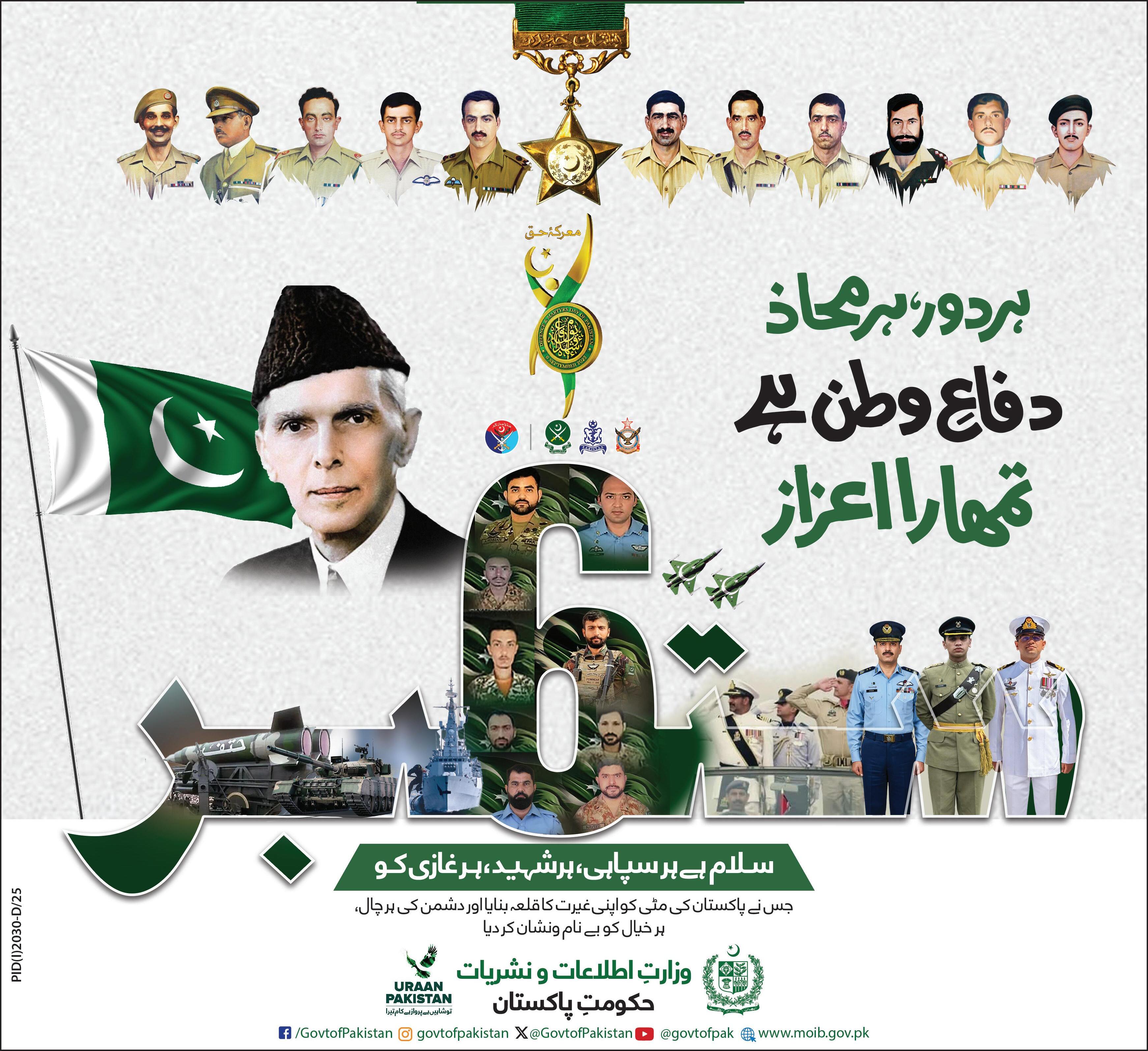

PM SEEKS CL IMATE RESIL IENCE PL
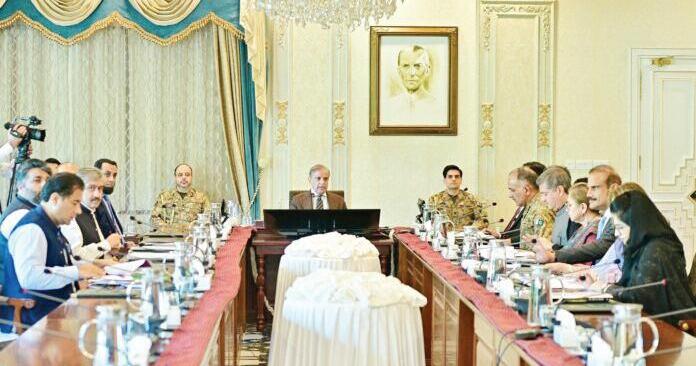



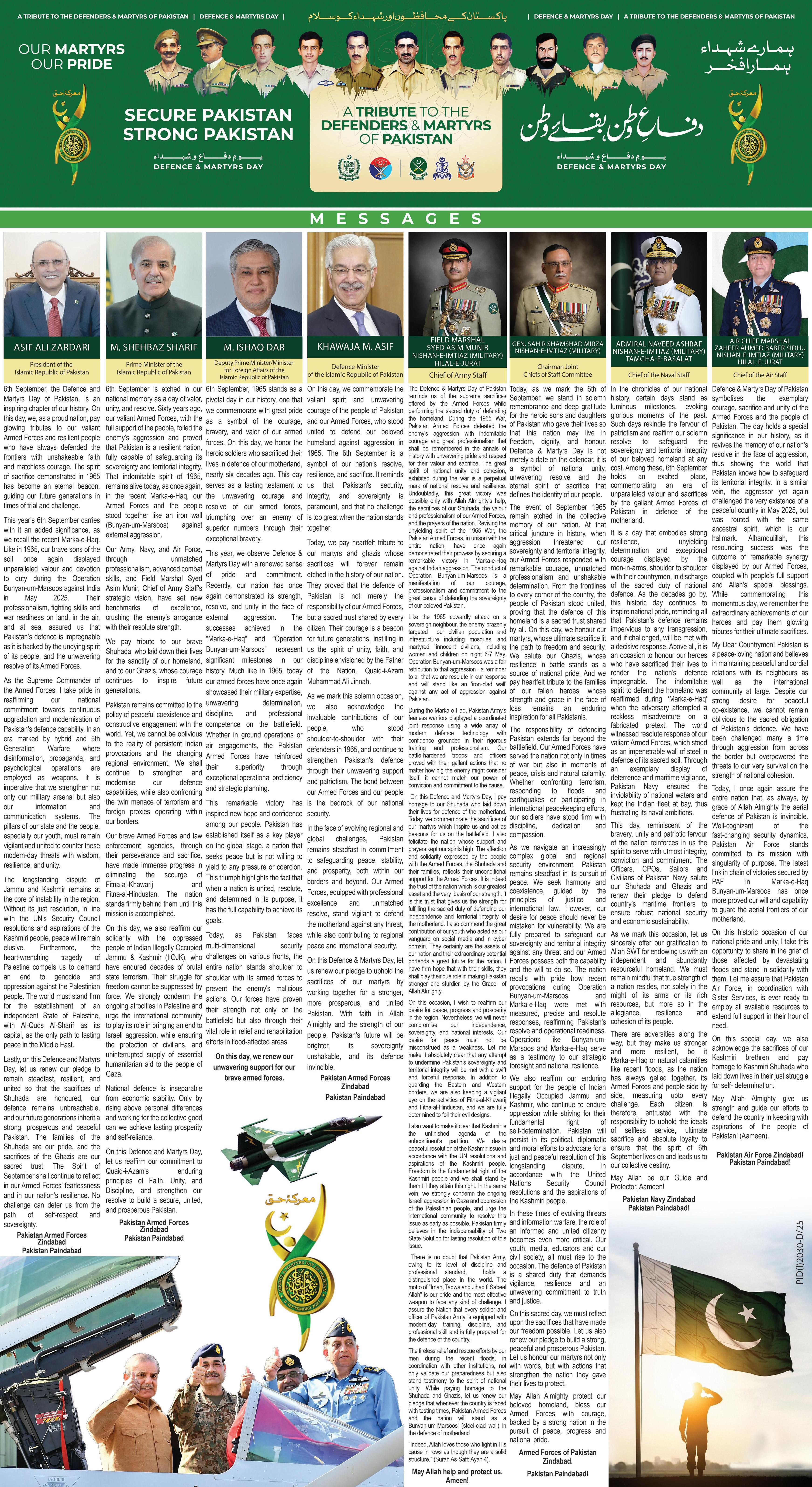



TShort-term inflation rises 1.29%, driven by higher prices of essential items
(83 45%), ladies sandals (55 62%), wheat flour (30 27%), gas charges for Q1 (29 85%) sugar (27 43%) gur (13 21%) beef (13 15%) moong pulse (12 99%) firewood (11 47%) vegetable ghee
the lowest consumption group, earning up to Rs17,732, increased
ISLAMABAD
N e w s D e s k
Chairperson of the Securities and Exchange Commission of Pakistan (SECP), Akif Saeed, on Friday, emphasized that the SECP is actively pursuing a comprehensive digitalization agenda aimed at improving access to finance enhancing financial inclusion and increasing efficiency in the delivery of financial services He made these remarks while speaking with Zia Ijaz, President of Askari Bank Limited, and senior members
market He outlined several ongoing initiatives to enhance opportunities for banks in the country including digital bank account opening for corporates, digital distribution of financial products (such as mutual funds, pension funds, and insurance) auto-induction of private company shares into the central depository system and an expanded role for banks in both primary issuance and secondary trading of equity and debt instruments The Chairperson commended Askari Bank for its pioneering role in advancing Sukuk as a Shariah-compliant alternative to conventional debt which enables corporates to diversify
their funding sources while offering high-quality investment opportunities to both institutional
companies preparing to take part in leading international exhibitions in major Chinese cities according to a news report According to the Trade Development Authority of Pakistan (TDAP) 2025-26 calendar, business delegations will attend a series of events in China to showcase their products The sectors being promoted include seafood fruits textiles carpets leather goods and multi-category
exports, reflecting Pakistan’s strategy of diversifying its export base while consolidating its position in China s fast-growing consumer markets Pakistani exporters will participate in the Seafood and Fisheries Expo in Qingdao from October 29–31, 2025, the Asia Fruit Logistica in Hong Kong from September 3–5 2025 and the Intertextile Shanghai Apparel Fabrics Exhibition in September 2025 The country s leather sector has already been represented at the All-China Leather Exhibition in Shanghai last month and will again be showcased at the APLF fairs in Hong Kong in March 2026
Multi-sector participation is planned at some of China’s largest trade platforms including the Canton Fair in Guangzhou from October 15 to November 4 2025 and again in April 2026 the China International Import Expo in Shanghai from November 5 to 10, 2025, the ChinaASEAN Expo in Nanning from September 17 to 21 2025 and the China-South Asia Expo in Kunming in June 2026 These exhibitions offer a gateway for Pakistani exporters to tap into the vast Chinese consumer market while also connecting with buyers from other Asian countries In addition to exhibitions, B2B meetings, seminars and other events will provide Pakistani exporters with
S enate panel seeks five -year agric ulture expor ts record af ter Ital y raises concerns

idle and deteriorating at airports In response Ahsan announced the next committee meeting would be held in Karachi to inspect the planes and directed officials to ensure full compliance with prior committee recommendations
AsiaPak, China Resources par tner for plasma-derived medicines in Pakistan, attracting $235m FDI
g PL ASMA COLLEC TION CENTERS IN NORTH PUNJAB AND EAST KP TO BE ESTABLISHED WITH $25 MILLION, PAKISTAN’S ONLY FR AC TIONATION FACILIT Y SET UP WITH $210 MILLION, CREATING HUNDREDS OF SKILLED JOBS AND EX PLORING
ISLAMABAD/BEIJING N e w s D e s k AsiaPak Investments has partnered with China Resources Boya Bio-Pharmaceutical Group to strengthen Pakistan’s national health security and attract $235 million in foreign direct investment The collaboration focuses on ensuring self-sufficiency in plasma collection and plasma-derived medicinal products (PDMPs), a critical component of life-saving therapies The agreement signed in Beijing on September 4 2025 was witnessed by Pakistan s Prime Minister Mian Muhammad Shehbaz Sharif AsiaPak Investments will invest $25 million to establish the first wave of plasma collection centers in north Punjab and east Khyber Pakhtunkhwa with a central hub planned in Islamabad in 2026 for plasma collection lab testing storage logistics, and administrative functions An additional $210 million will be invested to build Pakistan’s only fractionation facility for plasma-derived medicines creating hundreds of highskilled jobs and exploring potential export opportunities to regional markets AsiaPak a diversified Pakistani company, has a history of successful partnerships with leading Chinese firms, including KE, Sino Sindh Resources (Thar Coal Block One) Liberty Power Daharki Daewoo Express Lotte Chemicals and BOL TV China Resources Boya is among the top five biopharmaceutical companies in China, with 2023 revenues of $440 million and a market capitalization of $2 5 billion Its parent, China Resources, is a Fortune Global 500 conglomerate with annual revenues of $150 billion In the spirit of Iron Brothers China Resources is honoured to bring Chinese expertise and technology to save lives in Pakistan This is a win-win, said Kai Qiu, Chairman of China Resources Boya BioPharmaceutical Group Shaheryar Chishty Founder and CEO of AsiaPak Investments thanked the Special Investment Facilitation Council (SIFC) for their support in facilitating the joint venture, highlighting
that the initiative addresses Pakistan’s critical shortage of affordable plasmabased medicines while demonstrating the country s potential as an investment destination The Ministry of National Health Services and Coordination has supported the initiative by framing a policy for regulated export of source plasma and import of essential PDMPs balancing domestic healthcare needs with integration into global biopharmaceutical markets This partnership reflects a decadelong collaboration with China and aligns with Pakistan’s vision to attract foreign investment in high-impact sectors said Sameer Arshad Chishty Chairman of AsiaPak Investments Brigadier (R) Dr Nuzhat Mushahid of AsiaPak Investments acknowledged the role of Syed Mustafa Kamal in aligning provincial and regulatory bodies for the project The initiative is expected to position Pakistan as a regional leader in biopharmaceutical innovation ensure affordability and accessibility of PDMPs, and stimulate economic growth through biotechnology investment

COMMENT
CPEC 2.0
IT was appropriate the CPEC 2 00 was launched at the B2B Investment Conference in Beijing with Prime Minister Shehbaz Sharif as chief guest, where Chinese businesses hooked up with Pakistani to mark the new phase of the China-Pakistan Economic Corridor where it should play the really transformative role for Pakistan, and even China, that its conceivers envisaged The new phase of CPEC reflects the shifting from being primarily a government-to-government and business-to-government interaction to one in which businesses interact with other businesses This became clear from the 21 different MoUs and joint ventures signed at the conference worth $8 5 billion They covered agriculture electric vehicles solar energy health, chemical and petrochemicals, and iro and steel This shows how CPEC is moving beyond its original brief of fixing the infrastructure of Pakistan CPEC is designed so that there is a smooth passage from Gwadar Port of goods and raw materials from China through Pakistan CPEC would not just be served by roads and rail and the port but by Special Economic Zones where goods for export would be manufactured The MoUs and JVs will activate these SEZs, with the upgradation of the railway main line from Karachi to Peshawar as the focus of the infrastructure component of the next phase of CPEC However, the fu;; fruits and true benefits of CPEC will only ber realized by the success of these B2B ventures, because CPEC was never really meant to be G2G unlike such ventures as the Heavy Mechanical Complex Now that Pakistan has been helped to overcome its electricity generation and road development issues it is time for the next phase of CPEC to take off, as China and Pakistan demonstrate that they are indeed iron brothers/ Though CPEC has been multiply beneficial, not just for the two governments but the businesses involved (not to mention the millions of electricity consumers of Pakistan), it has faced a number of glitches Mr Sharif addressed these issues at the conference especially by assuring the investors both prospective and existing, of security for Chinese workers It is a striking phase of the first phase of CPEC which is presumably to continue into the next, that Chinese firms have sent their employees to work in Pakistan instead of trying to manage matters from afar It is not just the demand of hospitality, but also good business, to ensure their safety

Dedicated to the legac y of late Hameed Nizami Arif Nizami (Late) Founding Editor
M A Niazi Editor Pakistan Today Babar Nizami Editor Profit


Aof which are in Asia Africa and Latin America By establishing equity and mutual respect as foundational elements his approach challenges traditional power hierarchies and advocates for a future in which smaller and emerging nations are active participants rather than passive subjects China’s role in this transformation is pivotal Over the past four decades, the country’s rapid economic growth has not only lifted hundreds of millions of its citizens out of poverty but has also made significant contributions to global economic growth Under Xi s leadership this domestic success has been projected outward through initiatives like the Belt and Road Initiative, which has established connections across Asia Africa and Europe through trade infrastructure and investment
Now the broader vision for global governance extends beyond mere physical connectivity It seeks to create new norms and institutions that empower developing nations to have a greater voice in shaping policies that affect them For countries that have long been marginalized by the international order this vision offers the promise of genuine partnership and shared prosperity The concept of an Asian Century provides essential context for Xi s initiative Currently, Asia is the fastest-growing region globally, home to
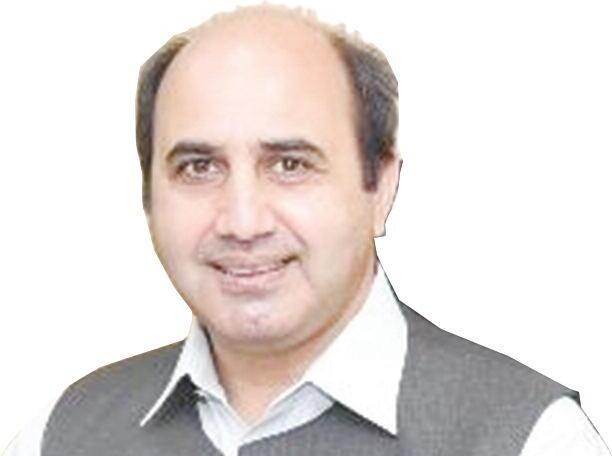

TH E gravest danger to a nation is not always the armies at its gates but the betrayal that festers within When men who are granted education respect and opportunity choose to turn their backs on their homeland the wound they inflict cuts deeper than any foreign strike Pakistan today faces this bitter reality in Balochistan, where militancy has seeped not only into rugged mountains but into classrooms offices and institutions once meant to serve the nation’s progress The case of Usman Qazi is a chilling reminder of this hidden war A university professor by profession Qazi confessed to aiding the banned terrorist organization Balochistan Liberation Army (BLA) His role went beyond sympathy, he provided shelter, logistics, and communications support, and even assisted in the Quetta Railway Station suicide bombing of November 2024 which claimed 32 innocent lives That rivers of blood were spilled while an educated man actively conspired with militants is not just an indictment of his character, but of the way extremism poisons the roots of society itself This betrayal cannot be explained by deprivation Qazi was not a worker denied bread nor a youth stripped of opportunity He enjoyed education status and security privileges millions are still denied His confession exposes a darker truth: when greed malice or the lure of foreign agendas corrupt those entrusted with knowledge, they become the sharpest blades against their own nation What makes this treachery uniquely perilous is the mask it wears Militants in the mountains can be seen and confronted but a man standing at the front of a classroom respected as a teacher while secretly serving terrorism is an enemy far more insidious He corrupts not only through violence but through influence, seeding doubt and distortion where knowledge should flourish When such figures fall, they do not collapse alone, they drag down the trust of their institutions and tarnish the dignity of their profession Qazi’s case is not just the crime of one man but a stark reminder of how deeply the enemy s poison can infiltrate if vigilance wanes Yet in every act of treachery lies a lesson And the lesson here is that Pakistan must never confuse education with loyalty, or status with sincerity The state
over half of humanity and a hub of technological and economic dynamism From India s advancements in digital innovation to Southeast Asia s expanding consumer markets from Japan and South Korea s technological leadership to Central Asia s energy resources, the continent is emerging as the gravitational centre of global progress President Xi’s initiative is compelling because it creates a platform for these diverse strengths to converge rather than clash It does not seek to impose a singular model but aims to foster cooperation among various development paths, guided by the principle of peaceful coexistence Critics often approach this initiative with skepticism, viewing it as Beijing’s attempt to reshape the global order to its benefit However the core of this vision acknowledges the shortcomings of the current system Institutions like the United Nations the International Monetary Fund, and the World Bank, while still relevant, were established in a time when Asia and the developing world had little influence Today, those same regions are significant drivers of global growth and their voices demand representation that reflects their contributions To ignore this shift is to deny reality itself The Asian Century is not a distant prophecy; it is already manifesting through economic integration, cultural influence, and technological leadership that extend well beyond the continent
Xi’s call for global governance encompasses not only the assertion of Asia s position but also the acceptance of responsibility With influence come obligations: to maintain peace reduce inequality, safeguard the environment, and create systems that embody shared human values While China positions itself as a leader in this process the initiative is an invitation for all Asian nations and the broader world to engage The vision asserts that development is a right for all rather than a privilege for a few and that humanity s challenges can only be addressed through cooperation In this context, the initiative seeks to redefine what leadership means in the 21st century not domination, but stewardship; not coercion but partnership The rise of Asia need not pose a threat to others Instead it can serve as an opportunity to reimagine global systems in ways that are more
must recognize that foreign-sponsored militancy is not only fought on borders or in barren hills it is fought in the realm of minds Institutions must guard not only against ignorance but against infiltration, against propaganda, against the whispers of those who wear a friendly face but carry a hostile heart Amidst this darkness however the resilience of Balochistan’s people remains the nation’s greatest hope Despite decades of violence the ordinary Baloch still seeks peace education and dignity They are tired of being used as pawns, tired of militants who burn their schools, of leaders abroad who trade their blood, and of ‘professors’ who betray them in the name of hollow causes They deserve better than traitors who gamble with their future for money or secret ties They deserve progress built on honesty loyalty and courage The future Pakistan must carve for itself cannot rest on half-measures or vague promises; it demands clarity of purpose and courage in execution Two imperatives are urgent and inseparable: the merciless dismantling of networks that thrive on treachery, and the immediate uplift of those who suffer because

equitable inclusive and sustainable For decades Western powers have dictated the terms of globalization often leaving developing nations to grapple with its downsides without reaping its full benefits The new vision for global governance offers a corrective path If implemented effectively, it can help bridge the development divide reduce mistrust among nations and establish frameworks where cooperation on shared challenges takes precedence over narrow geopolitical rivalries
The future of the Asian Century will hinge on economic and technological prowess and the capacity to create political and institutional frameworks that reflect the interconnectedness of humanity Xi’s initiative for global governance addresses this necessity It acknowledges that in a world interconnected by digital technologies supply chains and climate realities isolationism and unilateralism are relics of the past Only collective approaches can deliver stability, and only inclusive frameworks can ensure legitimacy
As history unfolds the dynamics of power are unmistakably changing The Asian Century is taking shape characterized by growth resilience, and innovation Xi Jinping s call for global governance articulates this reality and serves as a roadmap for navigating it Rather than representing a vision of dominance, it advocates for balance inclusivity and the understanding that the world is too complex and interdependent to be governed by outdated hierarchies If this initiative can overcome mistrust and translate into actionable steps, it has the potential to steer the international community toward a more stable and equitable future
Thus the Asian Century could become not only a narrative of rising powers but also of a rising humanity defined by cooperation shared responsibility and the acknowledgment that progress belongs to all
The author is Head of News of Pakistan Today He has a special focus on counter-terrorism and inter-state relations in Asia Asia Pacific and South East Asia regions He tweets as @mian abrar and can be reached at hussainmian@gmail com
Stinking oversight
Tax houdinis
New Phase in CPEC crucial to success
Mian abrar



PA K I S TA N is confronting an escalating climate crisis that poses a threat to its environment its economy, and the livelihood of millions Climate change has become an undeniable and inescapable reality within the country with rising temperatures irregular monsoon patterns accelerating glacial melt more cloudbursts and catastrophic floods that destroy entire communities in hours
Pakistan despite being one of the smallest contributors to global greenhouse gas emissions, is consistently ranked among the most climate-vulnerable countries Its location diverse topography and heavy economic dependency on agriculture exacerbate its susceptibility to climate-related hazards In recent years the heightened intensity and frequency of floods have caused immense destruction in both rural and urban settings Pakistan must adopt an urgent, comprehensive and multi-pronged approach to tackle climate change
The first and most immediate step is to systematically integrate climate resilience into its national planning and governance framework Climate change can no longer be treated as confined to the Ministry of Climate Change; it must become a central, cross-cutting pillar of policy in every sector including agriculture urban development water management energy and national security Policymaking must undergo a fundamental shift from being reactive to becoming proactive and preventive
This entails fully integrating climate adaptation measures into national development strategies urban master plans and rural development programmes It also means investing heavily in disaster risk reduction initiatives rather than merely responding to disasters after they have occurred A well-coordinated, cohesive strategy effectively linking federal, provincial, and local governments, and backed by data-driven decision-making and robust scientific research is crucial
One of the key elements is the improved management of water resources Pakistan is inherently a river-dependent country, with the Indus and its tributaries forming the backbone of its agriculture and economy However, they
have also become a recurring source of destruction when heavy rains and glacial melt combine to overwhelm riverbanks and reservoirs Strengthening water infrastructure is therefore essential This includes the strategic construction and diligent maintenance of new dams reservoirs and flood diversion channels Existing major dams such as Tarbela and Mangla require significant upgrades to increase storage capacity and improve safety mechanisms Concurrently, a network of small and medium-sized dams should be constructed in mountainous regions to better regulate water flow and prevent sudden destructive flooding downstream The Kala Bagh Dam project was a very promising initiative, but unfortunately, did not proceed due to political disagreements
Effective and regular desilting operations ongoing maintenance and the implementation of real-time monitoring of water levels can significantly enhance the country s overall capacity to manage floods
There is a critical need for large reservoirs and dams that can store excess water during monsoon periods, which can then be utilized during times of water shortage In many areas a great deal of garbage is indiscriminately thrown into rivers and canals and there is a notable absence of enforcement to stop this practice This accumulating garbage reduces the cross-sectional area, depth, and width of rivers and canals, which directly contributes to rising water levels during periods of heavy rain and glacial melt
Reforestation and strategic watershed management also play a critical role Trees naturally help to absorb rainfall stabilize soil, and prevent erosion, all of which are essential to reducing the risk of floods and landslides caused by cloudbursts Pakistan’s ambitious tree plantation initiatives such as the Billion Tree Tsunami are steps in the right direction but must be followed up with
committed long-term maintenance, genuine community engagement, and strong protections against illegal logging and urban encroachment Natural barriers such as wetlands mangroves and riverine forests should be preserved and actively restored as effective buffers against floodwaters and rising sea levels In the mountainous northern regions, afforestation efforts combined with sustainable land management practices can greatly reduce damage from flash floods and glacial lake outburst floods
Urban planning in Pakistan must undergo a radical transformation to account for the new realities of a changing climate Rapid unregulated, and often chaotic urbanization has led to cities expanding into natural floodplains and riverbanks, thereby turning episodes of heavy rainfall into urban flooding disasters Major cities like Karachi Lahore Rawalpindi and Islamabad frequently suffer from chronically blocked drainage systems poor waste management and widespread encroachments on natural water channels
To tackle this, city administrations must invest heavily in modern, high-capacity drainage and sewage systems that can handle intense downpours Urban flooding can be minimized through the construction of rainwater harvesting systems the use of permeable pavements, the installation of green rooftops, and the digging of artificial recharge wells Zoning laws must be strictly enforced to prevent construction in topographically vulnerable areas and illegal encroachments on stormwater drains and riverbeds must be removed without delay Public awareness campaigns should accompany these infrastructural and regulatory reforms to promote responsible urban living and encourage active community participation in flood prevention efforts
Pakistan must also prioritize the modernization of its early warning systems
Many
cloudbursts occur with little to no advance warning, catching communities completely off-guard Investing in advanced meteorological infrastructure such as Doppler radars weather satellites and a dense network of ground-based monitoring stations will enable more accurate forecasting and allow for quicker dissemination of alerts Developing localized weather prediction systems specifically tailored to the complex topography of each region, especially in the mountainous north can save countless lives Equally important is the development of efficient and redundant communication networks to ensure that warnings reach even the most remote and vulnerable populations Communitybased disaster preparedness programmes, where local residents are trained in basic evacuation drills and rescue techniques can create a vital first line of defense Another area of growing concern is the accelerated melting of glaciers in Pakistan s northern regions, which are the primary source of water for the country s rivers With temperatures rising steadily due to global warming, these glaciers are receding fast, forming numerous unstable glacial lakes that can burst without warning The increasingly common GLOFs phenomenon poses a severe danger To address this the government ideally with the support of international partners possessing technical expertise, must invest in comprehensive monitoring and detailed mapping Engineering interventions such as controlled drainage systems specially designed glacial dams and protective walls can be employed to minimize the risk of flooding Additionally, domestic research institutions and universities should be encouraged to conduct studies on glacier dynamics and climate impacts specific to Pakistan’s geography Climate adaptation also necessitates a broader economic transformation Pakistan s heavy reliance on agriculture renders the national economy particularly vulnerable There
This is not a conflict to be won with temporary fixes or reactive measures It requires a holistic, multi-sectoral strategy that thoughtfully integrates environmental protection with economic development, disaster management with forward-looking urban planning, and scientific insight with active community engagement The time for action is not in the future; it is now. Delay comes with a higher cost measured in lives lost, homes destroyed, and futures irrevocably jeopardized
A Palestinian state would be good for Israel
continue


MO R E than a half century after the 1967 Arab-Israeli war and the passage of UN Security Council Resolution 242 which established the principle by which Israel would give up territory it gained in the war in exchange for peace and security the Israelis and the Palestinians have made no meaningful, much less lasting, progress on their core differences It is time for this to change What little opportunity still exists for realizing progress toward a durable agreement between the Israelis and the Palestinians one that would serve both parties interests is fast fading Political and physical barriers to compromise will soon pass a tipping point Israel, mostly owing to its own efforts, now finds itself in a favorable security environment, in which threats along its borders and in the region have been seriously weakened if not eliminated The country has never been in a better position to address the strategic challenge posed by Palestinian nationalism which will require a response with political as well as military dimensions But such an environment cannot last forever Although Israel has a friend in the White House who is prepared to back it in important ways, long-term U S and European support for Israel is not guaranteed, especially if even more Americans and Europeans come to view it as a pariah state denying rights to others Israel faces a stark choice It will either need to make a sincere bid for compromise and peaceful coexistence with the Palestinians or risk losing the international support that its longterm well-being requires Although the two-state solution has become anathema to many Israelis, it remains the best hope for their prosperity and security That having a state of their own would be good for the Palestinians goes without saying But it would also be good for Israel; indeed helping to bring about a Palestinian state has the potential to serve
have
Parties on the political left have waned, and those on the right have strengthened This political shift has been underway for decades but has rapidly accelerated since Hamas s brutal attack on Israel on October 7 2023
Many Israelis and their supporters around the world now strongly oppose a Palestinian state fearing that it would become a base from which armed factions would mount operations Some argue that a two-state solution would whet rather than satisfy Palestinian political ambitions Others oppose a Palestinian state not just for these reasons but also because they eye Gaza and the West Bank for Jewish settlement
LONG-TERM SECURITY: Still, a two-state solution is not yet dead and buried Both the Israelis and the Palestinians would be better off with a viable, independent, sovereign state inhabited by Palestinians and run by them but one premised on conditions that would preclude it from posing a security threat to Israel
A Palestinian state rather than providing a base for terror would be more likely to reduce it in ways that the Israel Defense Forces cannot That is because terrorists can now act with near impunity, as they are not responsible for any territory or economy and have no citizens to answer to Absent a Palestinian state Israel likely faces a forever war By contrast the government of a Palestinian state would face the military and economic consequences of any attacks it authorized on Israel which would be acts of war rather than terrorism, and of unauthorized attacks that occurred from within its borders, which a sovereign government is expected to prevent This reality should motivate a responsible government one not run by Hamas to act in constructive ways while providing Israel recourse if Palestinian leaders proved unable or unwilling to meet their international obligations Israel enjoyed international support for such recourse in the immediate aftermath of October 7 But Israel has lost any such understanding and sympathy during the period of more than 22 months in which it has killed tens of thousands of Palestinian civilians and exposed many more to conditions of extreme hardship Resolving the Palestinian issue would also create a context in which the Abraham Accords and normalization between Arab countries and Israel more generally, could continue and broaden Arab states could comfortably sell normalized relations with Israel to their citizens if they could point to a path for Palestinian statehood Saudi Arabia’s de facto leader Crown Prince Mohammed bin Salman has made clear that it is Israel s unwillingness to restart diplomacy predicated on the prospect of a two-state outcome that holds him back from pursuing closer ties with Israel Similarly, a Palestinian state would enhance the stability of Israel s neighbors, above all Jordan, because satisfying the call for such an entity would relieve pressure on the Jordanian monarchy which has long been willing to live in peace with Israel but would face domestic instability were an influx of Palestinians to enter the country and upset its demographic and political balance A separate Palestinian state would also be good for Israel s identity and internal cohesion There are some two million Arab citizens of Israel, some of whom could
be radicalized if Israel continues to frustrate Palestinian political ambitions and treat Palestinians so harshly Even more fundamentally a Palestinian state would free Israel from having to choose between being a democracy and being a Jewish state: granting five million Palestinians equal rights would threaten the latter, while denying them such rights would threaten the former Being seen as open to a Palestinian state would help Israel avoid pariah status around the world, a reality that is gaining momentum as a reaction to Israel’s military operations in Gaza It would reduce the threat of economic sanctions from Europe and stem the growing alienation of many Americans including younger American Jews a trend that over time could even jeopardize U S military support for Israel Israeli openness on this matter might also reduce anti-Semitism globally
Last but most pressing support in principle for a Palestinian state would offer Israel a pathway out of Gaza and to getting the remaining hostages back LESS IS MORE: For those who still favor a two-state solution, the objective for the immediate future should be to preserve the possibility of more ambitious diplomacy and create conditions that would give such diplomacy a chance of one day succeeding
This policy should have two dimensions: one of avoidance and another of creation Regarding the former governments ought to eschew calling for Palestinian selfdetermination To paraphrase the Camp David accords that Washington helped broker between Egypt and Israel in 1978, the Palestinians should have the right to participate in the determination of their own future but not to declare or decide it unilaterally A Palestinian state must be created in tandem with Israel
Another form of unilateralism to be avoided is the declaration from concerned outsiders namely Australia, Canada, France, and the United Kingdom of their intention to recognize a Palestinian state this fall if there is no cease-fire in Gaza Although these powers view their actions as helpful in practice they are anything but The Israelis and the Palestinians must reach an accommodation and Palestinians must internalize that a state of their own if Israel is to allow it cannot be delivered by others without compromise on their part Adding to the problem is that the choice to recognize a state of Palestine now appears to reward Hamas rather than a moderate alternative Israeli unilateralism must also be resisted Here the onus falls on the United States because politics in Israel have developed in such a way that Israel left to its own devices will not exercise restraint The Trump administration should make clear its opposition to new settlements, new outposts, and any annexation of Palestinian territory It should also communicate its expectation that settlers and Israel Defense Forces units will respect Palestinian human rights and property rights What would add teeth to such a stance (something this and previous U S administrations have largely resisted doing) would be a message from Washington that going forward Israel will not be able to count

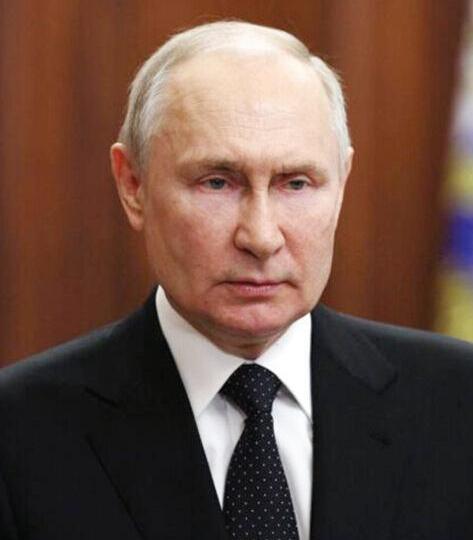
China warns Philippines against tramping on China’s red line
Guo Jiakun the spokesperson for the Chinese Foreign Ministry stated that China has observed Philippines Defense Minister Gilbert Teodoro and others making irresponsible remarks and deliberately provoking issues related to Taiwan and other matters concerning China on multiple occasions In response to Philippine defense minister Gilbert Teodoro’s claims that China should not impose
Trump says India and Russia appear
lost ’ to ‘deepest, darkest C hina’
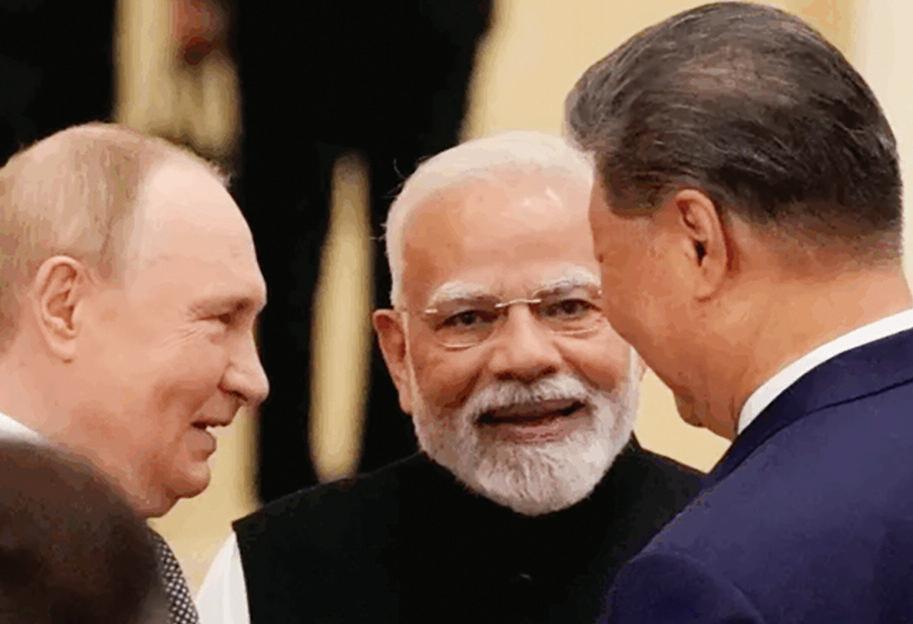
US worth about $48 billion now face a cost disadvantage against rivals from Vietnam, China and Bangladesh, Ralhan said last week ahead of an exporters’ meeting with the finance minister Thous
been laid off exporters have said

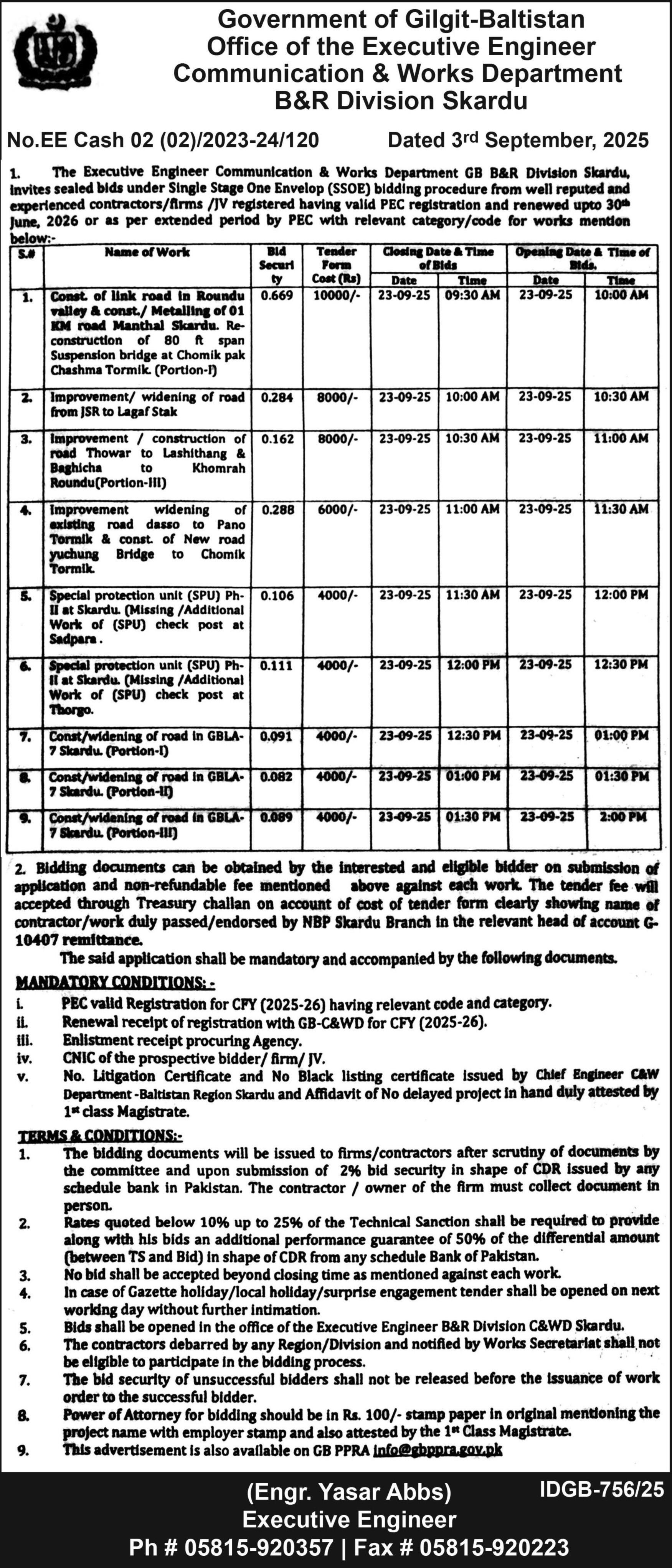

CM MARYAM CALLS FOR MASTER PL AN TO PREVENT FUTURE FLOODS
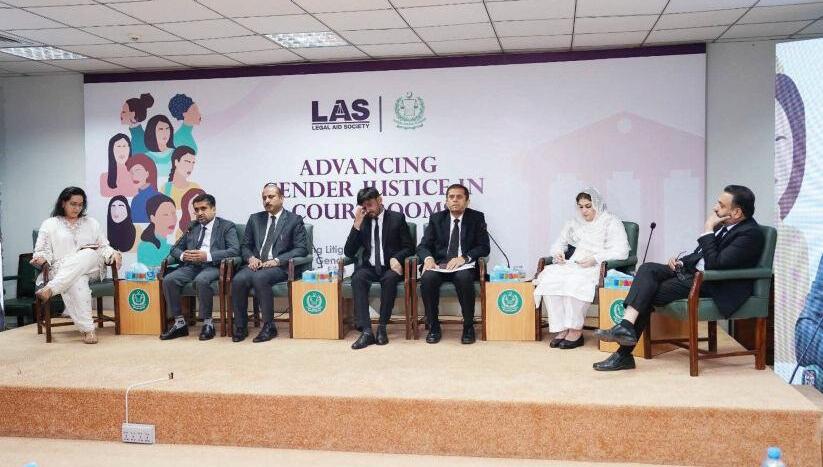
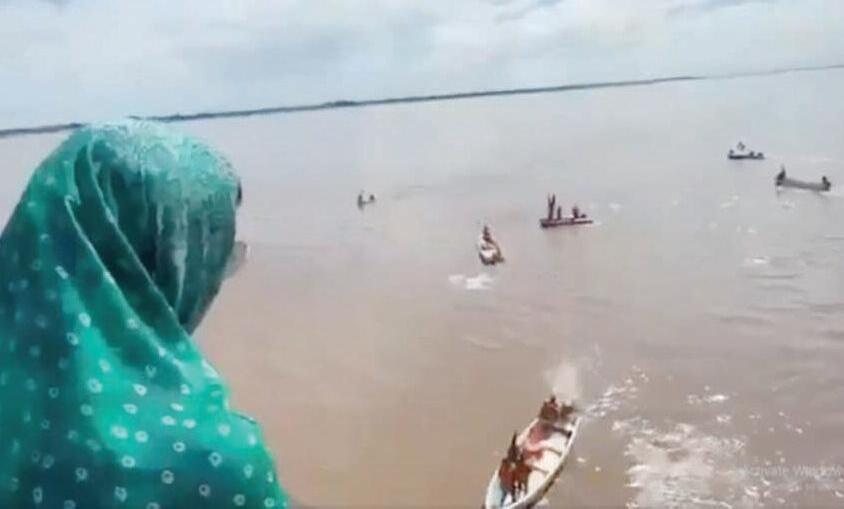
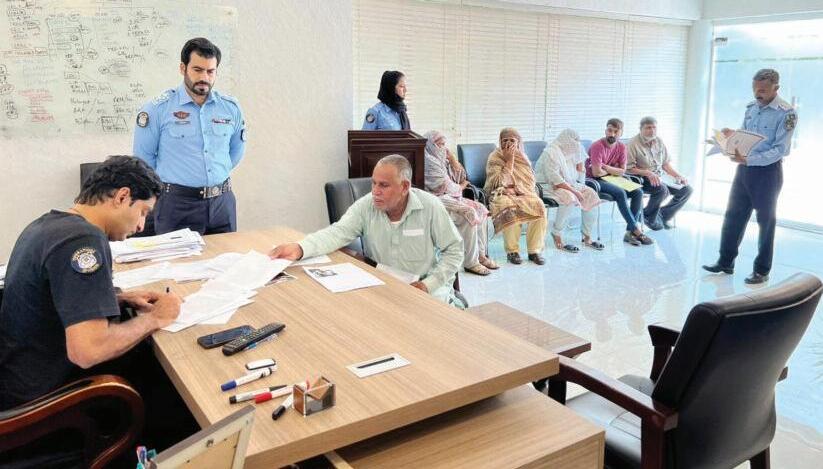
Punjab Police has finalized a comprehensive security plan for Eid Miladun Nabi (SAWW) with Inspector General of Police (IGP) Dr Usman Anwar reaffirming the force’s commitment to provide foolproof security to all processions rallies and gatherings across the province Security will remain on high alert and strict vigilance will be maintained over miscreants and anti-state elements to ensure peace and tranquility on the auspicious occasion ” the IGP pledged Sharing details of the security plan a Punjab Police spokesperson said that security has been arranged for a total of 1,398 gatherings

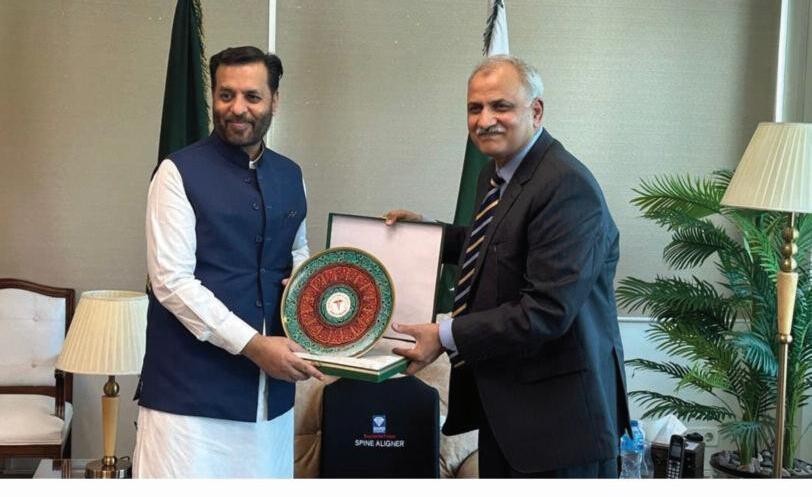

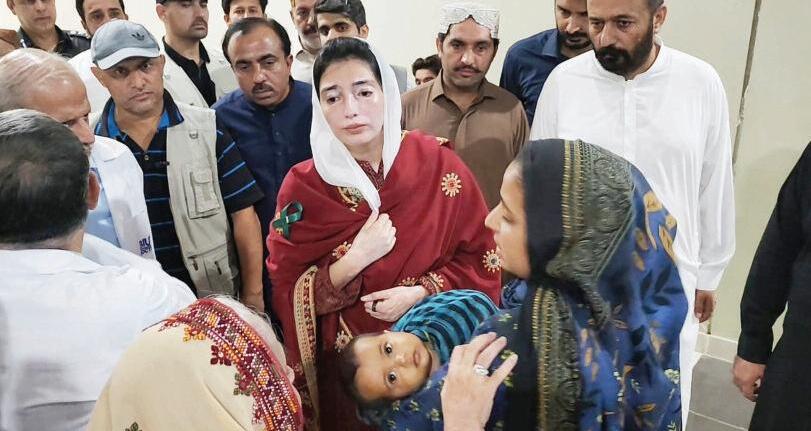
and Percutaneous Nephrolithotomy (PCNL) Notably, BIUT has successfully introduced robotic surgery for renal cancer and congenital anomalies providing minimally invasive treatment for complex urological diseases


Tthis soil, molded by sacrifice, hardened by trials, and elevated by faith They carry on their shoulders not just weapons but the trust of millions
Their oath is not ink on paper it is blood on the battlefield, sweat in training grounds, and tears in the prayers of their families They are warriors in war, guardians in peace, and saviors in calamity When floods devastate villages it is their hands that rescue When earthquakes topple homes, it is their arms that rebuild When enemies threaten, it is their courage that answers The defence of Pakistan is not bound by geography it is a living spirit that flows through every desert mountain and ocean It is carved into the snowy peaks of Siachen, carried across the waves of the Arabian Sea, and etched into the skies where the Shaheens soar It is a spirit that whispers in the wind beats in the drums of parades and echoes in the azaan at dawn It is eternal
Our enemies know well: whenever they dared to test Pakistan, they found themselves shattered against an unyielding wall Tanks rusted before reaching Lahore aircraft fell before touching our skies and ambitions drowned before crossing our waters
For the defenders of Pakistan do not fight for conquest they fight for survival with dignity They do not fight for power they fight for faith honor and homeland And those who fight with such purity can never be defeated In 2025, the challenges have evolved, the threats have shifted, but the resolve remains unchanged Today’s wars are fought not only with bullets but with narratives not only with tanks but with technology not only on battlefields but in hearts and minds Yet, Pakistan s defenders stand ready, armed not only with
weapons but with wisdom, not only with strategy but with spirit Hybrid warfare, psychological operations, digital propaganda none can pierce the shield that is formed when the nation and its defenders stand as one
This unity is Pakistan s true weapon It is what transforms our armed forces into something beyond military might it transforms them into a living breathing embodiment of national pride Every soldier at the border knows he is not alone Behind him stand mothers whispering prayers, fathers raising their hands to the sky, children waving flags, and a nation that will never let him fall This bond cannot be broken; it is the essence of Bunyan-unMarsoos the wall that no enemy can breach And so, every Defence Day, we do not just remember we renew We renew the pledge of faith, the covenant of sacrifice the promise of resilience We remind the world that Pakistan is not defended by fragile hands but by invincible ones Its sovereignty is not a gift to be taken; it is a right safeguarded by blood Its flag is not a piece of cloth; it is a symbol dyed in the sacrifices of martyrs As the
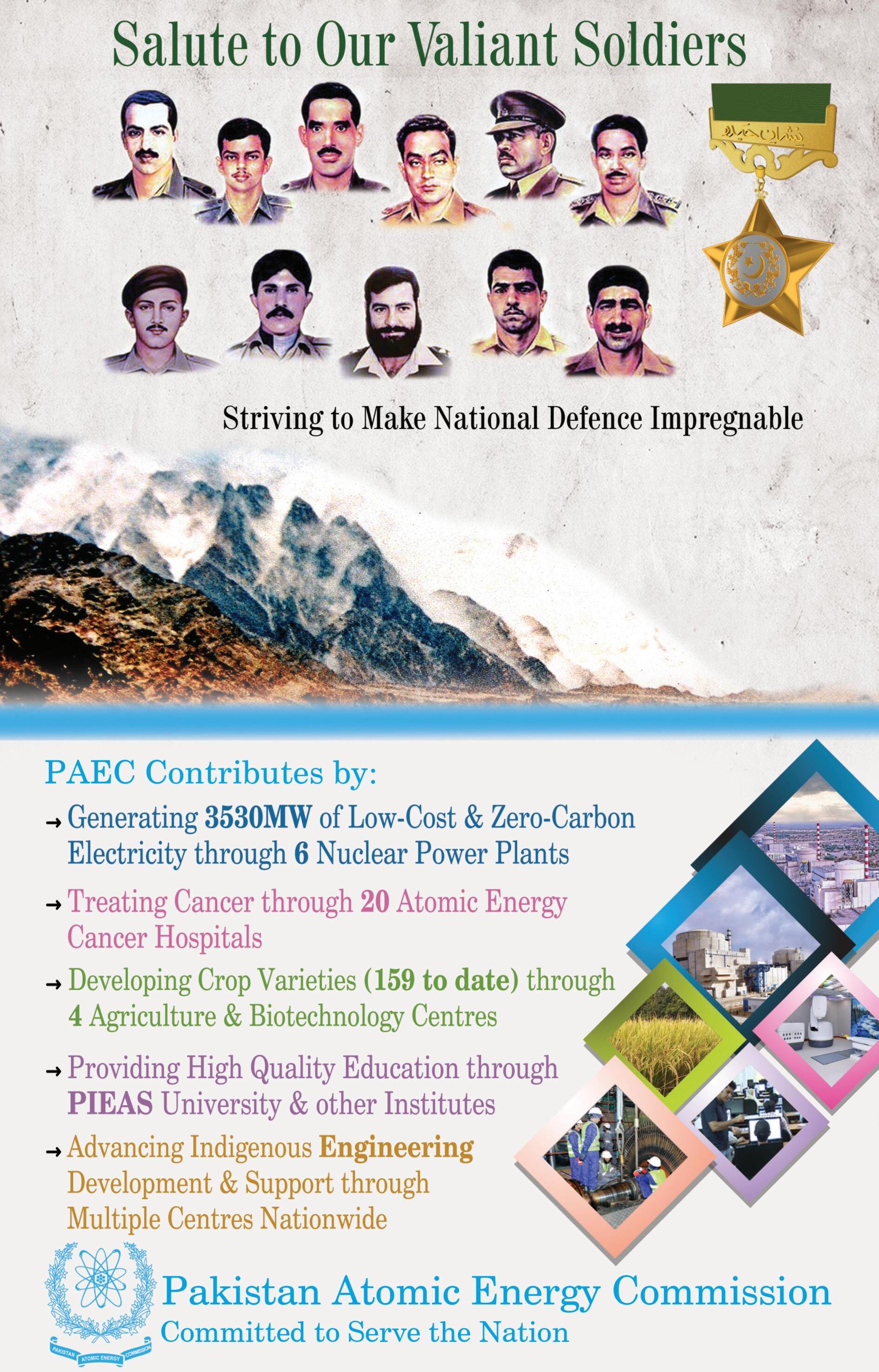

Kaneez ayesha abbasi

